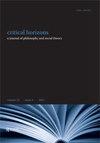Mimetic Inclinations: An Introduction
IF 0.4
Q3 SOCIAL SCIENCES, INTERDISCIPLINARY
引用次数: 0
Abstract
At first glance, it may appear perplexing to join the ancient concept of “mimesis” with the contemporary concept of “inclinations” via the title of “mimetic inclinations” – and for more than one reason. After all, Plato staged a philosophical critique of mimetic arts in the Republic via the trope of a metaphysical mirror that turns the real world into an appearance, a shadow, or a phantom far removed from reality. As such, the scene was staged for an agonistic confrontation that pits the philosopher against the artist, placing the abstract Forms in the vertical sky of eternal ideas in tension with the horizontally inclined world of aesthetic simulations. From the vertical,meta-physical perspective, the dominant definition of mimesis understood as a mirroring copy or representation of reality that in-forms (gives form to) Western metaphysics is thus at odds with the pluralism internal to an embodied, dramatic, and relationally inclined ontology that, contra Plato, is now reappearing on the contemporary philosophical scene. This relational ontology is constitutive of what the Italian feminist philosopher, classicist, and political theorist Adriana Cavarero has recently grouped under the rubric of “inclinations” (inclinazioni). She provides a different position, or disposition, towards others that troubles the ideal of a self-possessed, autonomous, and solipsistic subject in favour of a magnetic and affective “force”. This force inclines subjectivity towards alterity – thereby proposing a different ontological posture to rethink ethical and political relations constitutive of being in common with others in this world. Adriana Cavarero is one of the most influential contemporary Italian philosophers writing today. A feminist thinker with a pluralist training in classics, political theory, and literary theory, Cavarero is a protean theorist whose work spans the history of Western philosophy – from Plato to Kant, Hannah Arendt to Judith Butler, and beyond. Furthermore, she develops a pluralist thought that goes beyond ancient quarrels between philosophy and literature to rethink the human condition for present and future generations. Cavarero’s influential and now classic works like In Spite of Plato (1995), Relating Narratives (2000), Stately Bodies (2002), For More than one Voice (2005), Horrorism (2008), and, more recently, Inclinations (2014) and Surging Democracy (2021) have rethought the foundations of the subject through a relational ontology attentive to vulnerability, precarity, and care, which she posits at the foundations of an ethics of non-violence. These concepts have been important for influential anglophone theorists like Judith Butler and Bonnie Honig, for instance.模仿倾向:导论
乍一看,将古代的“模仿”概念与当代的“倾向”概念通过“模仿倾向”的标题联系在一起似乎令人费解,原因不止一个。毕竟,柏拉图在《理想国》中对模仿艺术进行了哲学批判,通过形而上学的镜子的比喻,将现实世界变成了远离现实的表象、阴影或幽灵。因此,这一幕上演了一场激烈的对抗,让哲学家与艺术家对立起来,将抽象形式置于永恒思想的垂直天空中,与审美模拟的水平倾斜世界相张力。从垂直的、元物理的角度来看,拟态的主要定义被理解为对现实的镜像复制或再现,这种复制或再现是西方形而上学的形式(给予形式),因此与体现的、戏剧性的、关系倾向的本体论内部的多元主义不一致,与柏拉图相反,现在正在当代哲学舞台上重新出现。这种关系本体论构成了意大利女权主义哲学家、古典主义者和政治理论家阿德里亚娜·卡瓦雷罗(Adriana Cavarero)最近在“倾向”(inclinazioni)的标题下分组的内容。她为他人提供了一种不同的立场或性格,这种立场或性格困扰着一个自我控制的、自主的、唯我论的主体的理想,而支持一种具有磁性和情感的“力量”。这种力量使主体性倾向于另类——从而提出了一种不同的本体论姿态来重新思考构成与这个世界上其他人共同存在的伦理和政治关系。阿德里亚娜·卡瓦雷罗是当代意大利最有影响力的哲学家之一。卡瓦雷罗是一位女权主义思想家,在古典文学、政治理论和文学理论方面接受过多元主义的训练。卡瓦雷罗是一位千变万化的理论家,他的作品跨越了西方哲学史——从柏拉图到康德,从汉娜·阿伦特到朱迪思·巴特勒,等等。此外,她发展了一种超越古代哲学与文学之争的多元主义思想,重新思考当代和后代的人类状况。卡瓦雷罗的影响深远的经典作品,如《尽管柏拉图》(1995)、《相关叙述》(2000)、《威严的身体》(2002)、《不止一种声音》(2005)、《恐怖主义》(2008),以及最近的《倾向》(2014)和《澎湃的民主》(2021),通过关注脆弱性、不稳定性和关怀的关系本体论,重新思考了这一主题的基础,她认为这是非暴力伦理的基础。这些概念对朱迪思·巴特勒(Judith Butler)和邦妮·霍尼格(Bonnie Honig)等有影响力的英语理论家很重要。
本文章由计算机程序翻译,如有差异,请以英文原文为准。
求助全文
约1分钟内获得全文
求助全文

 求助内容:
求助内容: 应助结果提醒方式:
应助结果提醒方式:


